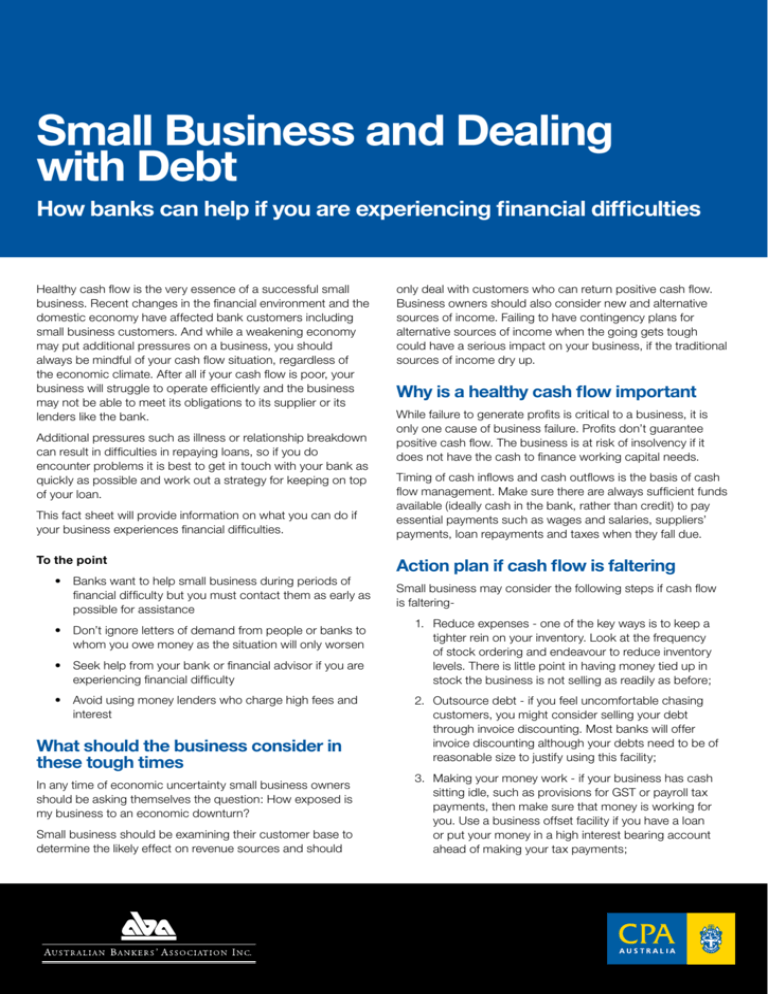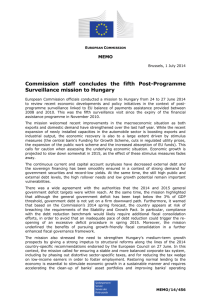
Small Business and Dealing
with Debt
How banks can help if you are experiencing financial difficulties
Healthy cash flow is the very essence of a successful small
business. Recent changes in the financial environment and the
domestic economy have affected bank customers including
small business customers. And while a weakening economy
may put additional pressures on a business, you should
always be mindful of your cash flow situation, regardless of
the economic climate. After all if your cash flow is poor, your
business will struggle to operate efficiently and the business
may not be able to meet its obligations to its supplier or its
lenders like the bank.
Additional pressures such as illness or relationship breakdown
can result in difficulties in repaying loans, so if you do
encounter problems it is best to get in touch with your bank as
quickly as possible and work out a strategy for keeping on top
of your loan.
This fact sheet will provide information on what you can do if
your business experiences financial difficulties.
To the point
• Banks want to help small business during periods of
financial difficulty but you must contact them as early as
possible for assistance
• Don’t ignore letters of demand from people or banks to
whom you owe money as the situation will only worsen
• Seek help from your bank or financial advisor if you are
experiencing financial difficulty
• Avoid using money lenders who charge high fees and
interest
What should the business consider in
these tough times
In any time of economic uncertainty small business owners
should be asking themselves the question: How exposed is
my business to an economic downturn?
Small business should be examining their customer base to
determine the likely effect on revenue sources and should
only deal with customers who can return positive cash flow.
Business owners should also consider new and alternative
sources of income. Failing to have contingency plans for
alternative sources of income when the going gets tough
could have a serious impact on your business, if the traditional
sources of income dry up.
Why is a healthy cash flow important
While failure to generate profits is critical to a business, it is
only one cause of business failure. Profits don’t guarantee
positive cash flow. The business is at risk of insolvency if it
does not have the cash to finance working capital needs.
Timing of cash inflows and cash outflows is the basis of cash
flow management. Make sure there are always sufficient funds
available (ideally cash in the bank, rather than credit) to pay
essential payments such as wages and salaries, suppliers’
payments, loan repayments and taxes when they fall due.
Action plan if cash flow is faltering
Small business may consider the following steps if cash flow
is faltering1. R
educe expenses - one of the key ways is to keep a
tighter rein on your inventory. Look at the frequency
of stock ordering and endeavour to reduce inventory
levels. There is little point in having money tied up in
stock the business is not selling as readily as before;
2. Outsource debt - if you feel uncomfortable chasing
customers, you might consider selling your debt
through invoice discounting. Most banks will offer
invoice discounting although your debts need to be of
reasonable size to justify using this facility;
3. Making your money work - if your business has cash
sitting idle, such as provisions for GST or payroll tax
payments, then make sure that money is working for
you. Use a business offset facility if you have a loan
or put your money in a high interest bearing account
ahead of making your tax payments;
Small Business and Dealing with Debt
How banks can help if you are experiencing financial difficulties
4. Overdrafts - if you are going to run into the red then
take a look at an overdraft facility. This may be the right
solution for a business where your cash flow ebbs into
overdraft for short bursts of time. However, if you need
a fully drawn advance to be repaid over time then a
principal and interest loan is probably a better bet.
Seek professional advice
If you are faced with a financial crisis, the first step may be
seek professional business advice. The investment may be
worthwhile in order, for example, to confirm your cash position.
Cash is the fuel which keeps your business going so it is
essential to concentrate on your cash flow and keep paying
the bills.
What should I do if i am experiencing
financial difficulties with my bank
credit facility?
Banks understand that small business can face unexpected
changes in their circumstances. Changes in your business
clientele or suppliers can affect your financial plans and your
ability to make loan repayments. The more your bank is able to
fully understand the problem and the causes, the more bank
staff may be able to assist you.
If you do find yourself in difficulty let your banks know as soon
as you can. Tackling a debt problem is easier when you act
early and get advice. Banks have specialist teams which work
on these issues.
Remember the most important thing to do is talk to the bank
as soon as possible. Don’t ignore letters of demand from
people to whom you owe money. It can only get worse.
How will my bank help me?
If you are in financial difficulty with your loan, it is in everyone’s
interest to find a solution. Banks will often make calls to small
business customers who are showing signs of repayment
stress and offer solutions to assist in debt management. But
you should not wait. If you are facing financial difficulty, speak
to your bank as soon as you can.
The Code of Banking Practice (which is available from the
Australian Bankers’ Association and most retail banks) sets
out the banking industry’s key commitments and obligations to
customers on standards of practice, disclosure and principles
of conduct for their banking services. It applies to personal
and small business bank customers. The Code also talks
about financial difficulty and what banks will do.
It states that if you agree, your bank will try to help you
overcome your financial difficulties with your credit facility with
the bank and could, for example, work with you to develop a
repayment plan. This may include extending the term of the
loan or changing your repayment schedule, if that’s suitable.
The law (the Consumer Credit Code) also allows for variations
to loan contracts where the borrower is suffering hardship
due to unemployment, illness or other reasonable cause. You
should talk to your bank about whether these provisions might
apply to your circumstances.
How do banks deal with small
businesses who are in financial
difficulty?
Your bank will try to come to a workable solution to help
the business through a period of financial difficulty. This can
involve working out what assets the business has available,
working out repayments, understanding the business’ cash
flow and reaching an agreement on a reasonable plan for
repaying the debt.
In some cases, this discussion may take place through
specialist teams. It may take time to fully understand the
situation of the business. After this, bank staff may provide
you with personal assistance and information to find the best
possible way to help you control and to manage your business’
financial obligations with the bank now, and in the future.
Each business’ circumstances are individual and different
banks will have different procedures.
Generally your bank will want to:
• Help you find solutions if you have missed a monthly
payments on loans;
• Discuss possible ways to assist you if you are unable
to make contracted repayments on loans, such as restructuring your debt so that you can repay it over an
extended period.
Some of the options that might be considered include paying
interest only for a period, increasing an overdraft or funding
facility, or considering some asset liquidation.
Banks treat each case individually and will not encourage you
to accept a repayment plan that the business cannot afford
or sustain. Banks may be willing to accept smaller payments
but they do not have to accept any offer of repayment just
because your business has contacted them. You will be given
every opportunity to agree satisfactory conditions for repaying
your business debt. However, if a satisfactory agreement
cannot be reached or an arrangement is agreed but the
business cannot keep to it, your bank may ask the business to
repay the loan in full.
It may be in the best interest of the business if it is sold or
wound up before too much equity is eroded. Your business
should seek professional advice before taking this step.
2
Small Business and Dealing with Debt
How banks can help if you are experiencing financial difficulties
Can I complain about how my case is
being handled?
If you are concerned or unhappy about the way your bank is
handling your case, you can complain to them. They will tell
you about their complaints handling system. Some banks have
consumer advocates who can make a free and independent
assessment of your complaint and help achieve a quick and
unbiased solution.
If you are not satisfied with the bank’s response, you can make
a complaint to the Financial Ombudsman Service (FOS). The
FOS is an independent complaints scheme that is free for
consumers. Refer your complaint to:
Financial Ombudsman Service
GPO Box 3
Melbourne VIC 3001
You can also telephone the BFSO office on 1300 780 808 or
visit their website for more information at www.fso.org.au
3
Small Business and Dealing with Debt
How banks can help if you are experiencing financial difficulties
Bank Resources
Bank
Resources
AMP Banking
13 30 30
ANZ
13 33 33
Bank of Cyprus Australia
1300 660 550
Bank of Queensland
1300 55 72 72 (Ask for the business assistance team)
BankWest
13 17 18
Bendigo and Adelaide Bank
1300 361 911
Citibank
13 24 84
Commonwealth Bank
13 22 21
HSBC
1300 308 008
ING Direct
1800 639 082
Laiki Bank
1300 88 700
Members Equity Bank
1300 658 108
National Australia Bank
13 22 65
St George Bank
133 800 (Business Direct Consultant)
Financial Tools can be found at:
www.stgeorge.com.au/promos/open-for-business/legal-andfinance-tools.htm
www.stgeorge.com.au
Suncorp Bank
13 11 75 (Business Call Centre:)
Suncorp encourages customers to contact their our Business
Call Centre at any time to speak to someone regarding their
particular circumstances. For customers experiencing specific
financial difficulties we have a dedicated team to assist them.
This team can be contacted on 1800 225 223
Information on the Suncorp website regarding assistance and
financial hardship:
www.suncorp.com.au/suncorp/customer_relations/financial
hardshipspx
www.suncorp.com.au/suncorp/personal/banking/financial_
hardship.aspx
Westpac
1800 067 497
Internet: www.bankers.asn.au and www.smallbusinessbanking.com.au
Phone: 02 8298 0417
Fax: 02 8298 0402
4
Legal Notice
Copyright © CPA Australia Ltd (ABN 64 008 392 452), 2009. All rights reserved. Save and except for third party content, all content in these materials
is owned or licensed by CPA Australia. All trade marks and trade names are proprietary to CPA Australia and must not be downloaded, reproduced or
otherwise used without the express consent of CPA Australia. You may access and display these pages on your computer, monitor or other video display
device and make one printed copy of any whole page or pages for your personal use only.
CPA127147 06/2009
CPA Australia has used reasonable care and skill in compiling the content of these materials. However, CPA Australia makes no warranty as to the
accuracy or completeness of any information contained therein nor does CPA Australia accept responsibility for any acts or omissions in reliance upon
these materials.
This Fact Sheet is; (i) intended to be a guide only and no part of the contents are intended to be advice, whether legal or professional; (ii) is no substitute
for the user seeking his or her own advice to keep abreast of any legal or other reforms and developments.
Limitation of Liability
To the extent permitted by applicable law, CPA Australia, its employees, agents and consultants exclude all liability for any loss or damage claims and
expenses including but not limited to legal costs, indirect special or consequential loss or damage (including but not limited to, negligence) arising out of
the information in the materials. Where any law prohibits the exclusion of such liability, CPA Australia limits its liability to the resupply of the information.








